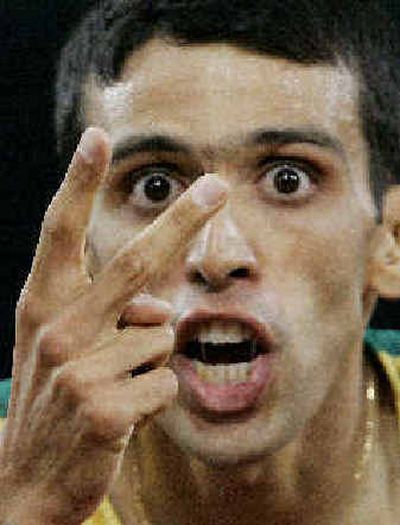Britain by a hair

ATHENS, Greece — Maurice Greene grabbed the baton and accelerated toward the finish, blowing past a Nigerian and reeling in Britain’s Mark Lewis-Francis.
But even the self-proclaimed greatest sprinter of all time could not make up for a sloppy handoff earlier in the race Saturday, and his chest crossed the line just a hair behind the Brit’s. The Americans were forced to settle for silver by an excruciating hundredth of a second on a night their teammates easily won gold in two other relays.
“I almost caught him in the end, but almost isn’t good enough,” Greene said. “I hope we pleased the fans and I hope we didn’t let anybody down. If we did, I apologize.”
The mighty men of U.S. sprinting, who’ve dominated the Athens Games with five of the six medals in the 100 and 200, lost the 400-meter relay for only the fifth time in Olympic history.
Greene’s close call was the biggest disappointment for Americans on the final night of Olympic track. Despite gold medals in the men’s and women’s 1,600 meters, the Americans were expected to win them all.
Led by Jeremy Wariner, the U.S. men won their 1,600 relay by nearly 5 seconds, capturing gold in 2:55.74 — just .17 seconds off the Olympic record. It was the seventh straight gold for Americans in that relay, not counting the boycotted 1980 Moscow Games. The U.S. women won their 1,600 relay in 3:19.01.
In the 400 relay, a sloppy handoff from Justin Gatlin to Coby Miller in the middle of the race left Greene too much ground to make up.
“Because of the crowd noise I couldn’t hear Gatlin call ‘stick,’ ” said Miller, who ran the third leg. “So I slowed down, because if I had run out of my pass zone we wouldn’t have won a medal at all.”
Gatlin said he stepped on Miller’s foot and ripped a hole in his shoe, “just like somebody cut it with scissors.”
One night earlier, a bad handoff from Marion Jones to 100 silver medalist Lauryn Williams knocked the heavily favored U.S. women out of their relay.
The U.S. team finished with 24 track and field medals, tops among all nations and the most by Americans since 30 in 1992. The men had 18 — also the best showing since 1992 — but the six women’s medals were the fewest since three in 1976.
The steroid scandal deprived the women of some of their top sprinters, and Jones accounted for five of the women’s seven medals in 2000. She was shut out in Athens.
Greene took the baton in second place and with a burst of speed in the final 30 meters, he almost made up the gap behind Lewis-Francis. If the race were 5 meters longer, he probably would have won.
Lewis-Francis crossed the finish line and turned to yell in Greene’s direction. His British team won in 38.07 seconds, and the Americans won silver in 38.08 — after saying for days they would smash the world record of 37.40. Nigeria took bronze.
Since 1920, the United States had won every 400-meter relay except for a silver in 1996, disqualifications in 1960 and 1988 for going out of the exchange zone, and the 1980 boycotted games.
Breaux Greer, who had hoped to become the first American to win the javelin since Cyrus Young in 1952, finished last of the 12 finalists with a best throw of 243 feet, 11 inches — nearly 43 feet off his personal best. Greer was competing despite a torn knee ligament that required him to wear a plastic brace on his right leg.
In other races, Hicham El Guerrouj became the first man in 80 years to win the 1,500 and 5,000 meters at one Olympics, holding up two fingers in triumph after outsprinting world record holder Kenenisa Bekele down the final straightaway of the 5,000.
But El Guerrouj, who won the 1,500 on Tuesday, was only the second person within a half-hour to pull off a rare middle-distance double. Briton Kelly Holmes won the 1,500 just before El Guerrouj’s race, adding to the 800 title she won on Monday.
For El Guerrouj, the greatest middle-distance runner of his generation, these games provided the first Olympic golds of his storied career. Four days after his emotional victory in the 1,500, he became only the second man to sweep the 1,500 and 5,000 in one Olympics.
The Moroccan passed Ethiopia’s Bekele with about 50 meters left and finished in 13 minutes, 14.39 seconds, smiling and extending his arms in triumph as he crossed the finish line.
Then he took off his new shoes and ran a victory lap in bare but bandaged feet. He had worn shoes that were too small during qualifying.
Bekele, who was trying to become the first man in 24 years to win the 5,000 and 10,000 at an Olympics, finished second in 13:14.59. Eliud Kipchoge of Kenya, who led until the final lap, won bronze in 13:15.10.
The only other man to win the 1,500 and 5,000 in an Olympics was Paavo Nurmi, who did it in 1924.
Holmes broke free of the pack in the final 100 meters to capture gold in the 1,500 in 3:57.90. The 34-year-old former army sergeant became the third woman in Olympic history to win both events at one games, joining Svetlana Masterkova in 1996 and Tatyana Kazankina in 1976.
Tatyana Tomashova of Russia won the silver in 3:58.12. Maria Cioncan of Romania got the bronze in 3:58.39.
Other winners in the track and field finale included a pair of Russians — Yuriy Borzakovskiy rallied from fourth place on the final straightaway to win the men’s 800 meters and Yelena Slesarenko set an Olympic record of 6-9 to win gold in the women’s high jump.
Andreas Thorkildsen of Norway won the javelin.